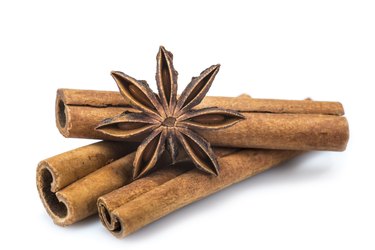
Revered for its medicinal properties by the ancient Egyptians, cinnamon is a savory spice found in the bark of Cinnamomum trees. Although it is a widely used spice, you may need to moderate your consumption if you are taking a blood thinner. The coumarin in the spice could increase your risk of bleeding. Talk with your doctor or nutritionist if you are taking an anti-coagulant to determine how much, if any, cinnamon you should have.
Blood Thinners
Video of the Day
Blood thinners, often called anti-coagulants, decrease the blood's ability to clot. Clots can obstruct blood vessels, leading to heart attack and stroke. Typically, physicians prescribe blood thinners to those who have atrial fibrillation, congestive heart failure and phlebitis. Sometimes it's prescribed for those who have obesity, according to the Texas Heart Institute.
Video of the Day
Coumarin in Cinnamon
The coumarin in cinnamon is a natural anti-coagulant that makes consuming too much cinnamon risky if you're taking a blood-thinning medication. In fact, the most commonly used anti-coagulant drug, warfarin, is a coumarin derivative. Ceylon cinnamon has a lower coumarin content than cassia cinnamon, which has up to 63 times more, according to ScienceDaily.com. Nonetheless, it is next to impossible to differentiate between the two when you're shopping for cinnamon.
Considerations
Other spices similar to cinnamon may be risky to use if you're taking a blood thinner. Cloves, ginger and nutmeg, for example, are all anti-coagulants, as they inhibit the platelet activity responsible for blood clotting, according to the California Pacific Medical Center. Although using these spices in small amounts in cooking shouldn't pose a problem, you should avoid taking them as supplements, the Cleveland Clinic warns. Speak to your physician before using any of these spices.
Bottom Line
Whether you are on a blood thinner or not, you should avoid excessively consuming cinnamon. Too much coumarin can cause bleeding and damage your liver. Those with liver conditions should be especially careful not to eat too much of this spice. If you're taking a blood thinner, talk with your doctor or nutritionist. They may tell you that you can continue flavoring your dishes with it, or they may tell you to discontinue using it altogether.
- Texas Heart Institute: Blood Thinners
- Cleveland Clinic: Anticoagulant Medication Warfarin (Coumadin)
- Virginia Commonwealth University: Coumarins
- Florida State University Molecular Expressions: Coumarin
- ScienceDaily; Levels of Coumarin in Cassia Cinnamon Vary Greatly Even in Bark from the Same Tree; November 2010
- “Food and Nutrition Notes”; The Power of Cinnamon; Mary Gettings, MS, RD, LDN, CDE; 2004
- U.S. Food and Drug Administration: Some "Vanilla Extract" Produced in Mexico is No Bargain